- Home
- Steve Erickson
Zeroville Page 14
Zeroville Read online
Page 14
178.
For a while he realizes he’s come to care more about the Sound than the Movies, and in his infidelity he’s ashamed, memories washing over him of his first days in Los Angeles when no one seemed to love the movies. I would never betray you, he promises the bathroom mirror, caressing his head. I might cheat on you for Kim or Natalie or Tuesday, but I would never betray you for any sound or music.
179.
One early morning in the dark after returning to the hotel, Vikar sits looking out the window at the park. It’s turned cold again. Christmas decorations go up all over the city. The heat of his night at the club, however, makes him unlatch the window and push it open. The park reflects off the glass of the window in the light from his suite. He keeps pushing the window in and out, the image of the park shifting with its reflection in the glass.
180.
I would never betray you, one lover might say to another in a scene, but by choosing one profile over the other, Vikar can lay bare either credibility or mendacity in the character, irrespective of the actor’s intention or the writer’s or director’s.
As people have right profiles and lefts, so places and moments have them. Vikar looks back and forth from the park below to its image in the window, listening to the image’s stereo. In a movie, every shot is a profile of something. By cutting from rights to lefts or vice versa, or from rights to other rights or from lefts to other lefts, Vikar reinforces or sabotages the audience’s perceptions, not to mention the film’s. He sets free from within the false film the true film.
He’s been working on Your Pale Blue Eyes for two months when, going over the previous day’s rushes, he hits the stop button and looks at the face in the frame before him.
181.
He picks up the phone and puts a call through to Mitch Rondell.
“I hear you’re a busy man these nights, Vikar,” Rondell says. The tone of concern is unmistakable. “At some point soon, it would be helpful if we took a look at what you’re doing.”
“It’s better if you trust me,” Vikar says.
“I’ll be honest—that makes us nervous. Why is it better?”
“Because otherwise it would be hard for someone to understand or for me to explain.” There’s silence on the other end of the phone. “Let me finish a little more.” Vikar adds, “Hiring another editor now would be bad.”
“We’ll be the judge of that,” Rondell says. “I didn’t say anything about hiring another editor.”
Vikar doesn’t answer.
“Tell me honestly how you feel it’s going.”
“I don’t know yet. That doesn’t mean,” Vikar says, “it’s not going well.”
“What does it mean?”
“It means I have to finish to know. It’s a matter of faith.”
“The faith feels a bit blind.”
“In one eye, perhaps.”
“This is all very poetic, Vikar, but both eyes would like to see what you’re doing. Take until the end of next week and then you need to show us something.”
“All right.”
“I’m also sending something over to your suite this afternoon. Depending on what I see next week, there will be more where that comes from.” Is it illicit narcotics? Vikar wonders. “You’ll find it when you get back to the hotel. You are going back to the hotel these nights, aren’t you?”
“Sooner or later.”
“They’re your nights, as long as it’s not hurting the picture.”
“All right.”
“We understand and accept that a certain amount of mystery is part of your personality, Vikar. You do understand that sometimes it unsettles people?”
“Yes.”
“Do you ever get unsettled?”
“I don’t believe so.”
“I guess that’s good.”
“I get other things.” Looking at the face in the viewer before him, Vikar says, “But I called about something else.”
182.
When Vikar returns to his suite that evening, a large stack of film canisters waits for him on the table in the front room. The Long Goodbye, Kiss Me Deadly, Sweet Smell of Success, Body and Soul, Monsieur Verdoux, To Be or Not to Be, A Hard Day’s Night, One Million B.C. (the final movie D. W. Griffith produced, and part of which he may have directed). When I get back to Hollywood, Vikar thinks, I’m going to need a bigger place.
183.
He doesn’t go to the club that night, and the next day he leaves the cutting room early and returns to the suite. He waits for a phone call, or a knock on the door.
184.
She holds her hair, wrapping her hand in it. She wears a black dress like the last time he saw her. “Hello,” he says.
“You are editing my film.” She smiles. “My film.”
“Come in.”
“I can’t. But perhaps we can go out Friday night.”
“Do you want to give me your phone number?”
“I will just come over, O.K.?”
“Yes.”
“We can go out and have a drink or go dancing or go to a club.”
Vikar says, “I know a very good club.”
185.
Until the last second, some part of him believes she’ll disappear again. When he answers the door Friday night, she wears a shorter, sexier dress and her lips glisten; she’s slightly flushed, and across her eyes is a mysterious veil, as though the eyes and lips are each of a different face. “I have to make one stop,” she says breezily in the taxi on its way down Fifth Avenue.
186.
The streetlights ripple across her face. A full moon hangs over Grand Central Station. “Is it waxing or waning?” she says. “I’ve been on the set so many nights I don’t know.”
“Which is which?” he says. “Which is becoming and which is begoing?”
“Waxing is becoming.”
“It’s waxing.” He says, “I didn’t know you were in this movie until I saw your face in the viewer.”
“I didn’t know you were on it,” she says, “until they told me.”
“What did they tell you?”
“They told me you were cutting the movie.” She half laughs, “I play the model’s friend.”
“I know.”
“It’s not a big part. I tried out for the part of the model.”
“I saw you in The Long Goodbye.”
“Yes, you told me.”
“I did?”
“That afternoon at Paramount. There was a limousine for you and you were going to Spain.” She says, “I was supposed to play the gangster’s girlfriend.”
“The scene with the Coke bottle.”
“At the last minute, the director decided no one would smash my face with a Coke bottle. They needed a more … disposable actress with a more disposable face. I lost the lead in L’Avventura for the same reason.”
“The woman who disappears on the island.”
“She was the second lead,” Soledad corrects herself, “she was a disposable character too. As with Altman, Antonioni said, ‘No one would lose you on an island.’ Driver, turn left here please.”
187.
The taxi turns on Thirty-Fourth Street. “Another block and a half,” Soledad says to the driver.
The taxi crosses Park Avenue.
“Pull over here please.” The taxi pulls in front of a parking structure. “I will be right back,” she says to Vikar, opening the door.
“Where are you going?” Vikar says.
“I will be right back.”
“I’ll go with you.”
“Stay and hold the taxi. I will be back.”
188.
Inside the club, Soledad says, “What is this?”
“Why did we stop at that parking structure?” asks Vikar.
She gazes around her. “I thought we were going to a club.”
“I believe this is a very good club.”
“I thought we were going to a disco, I thought we were going dancing.” She’s stricken by the spectacl
e; for a moment, her accent flares. “Everyone is looking at me,” in her short sexy dress, there among the ripped jeans and leather.
“They’re looking at me,” Vikar says. They’re both right.
“I don’t like this club.”
“I believe it’s a very good—”
“I hate this music. It’s not even music.”
“No,” Vikar agrees, “it’s the Sound.”
“It’s …” she thinks, “bárbaro. Barbaric.”
“Yes,” he says, “that’s it, barbaric,” and throws himself into the roiling pit of the audience.
189.
Outside, he tries to hail a cab while she waits under the awning. Standing in the empty street he turns to see Soledad gazing down at the sidewalk and the dirty barefooted woman in the hospital gown who always sleeps in the club doorway.
To Vikar’s astonishment, Soledad pulls off over her head her flimsy black dress, laying it over the woman as though it could keep her warm, and stands on the freezing New York sidewalk in nothing but her panties, high heels and a glimmer of recognition rooted seven years before and three thousand miles away, on Pacific Coast Highway.
Vikar looks around to see if anyone is watching. Some people stop to stare at the nearly naked woman but others just pass by; finally flagging the attention of a distant taxi, Vikar dashes to Soledad and removes his coat, draping it around her shoulders.
190.
“As we get older,” Soledad says in the cab back to the hotel, shivering in Vikar’s coat, “does the wall between youth and madness become higher? Or do we just learn how to … better stay on our side of the wall?”
“I don’t know,” Vikar answers.
“That club,” she says softly. “There was no wall.”
“No.”
“The bathroom was a cesspool.”
After a while Vikar says, “How is Zazi?” Soledad turns to him in the backseat; her breasts fall out of his open coat and press against his sweat-soaked shirt. “I wonder if I know what you mean, Mister Film Editor,” she says, and this time he knows she doesn’t wonder at all. “I wonder why you ask about that. She’s in L.A. With friends. With her father.” She whispers, “You want to get bárbaro, Mister Film Editor?” inches from his mouth, the passing lights from the street outside rolling across her face. She pulls his belt out of the loops of his pants and unbuttons the front and takes him in her hand.
191.
Back at his suite in the hotel, she says, “What’s this?” She holds it up before her eyes. In her other hand she still has his belt, carried defiantly through the hotel lobby.
“Something I made,” he says, “a long time ago.”
She examines it. “A toy house?”
“It’s not a toy, it’s not a house.” Vikar takes two small bottles of vodka and red wine from the mini-bar. Is this the moment for such autobiography? Is there any moment for such autobiography? “It’s a model of a church.”
She turns the model in her hand. “You take it with you wherever you go?”
“I was an architecture student.”
“I remember.” She points at one wall. “It’s bent.”
“From the earthquake. The big one, seven years ago.”
She studies the small steeple with its crowned lion holding a gold axe. “There is,” her eyes narrow at the other tiny walls, “no way out.”
“That’s what I believed. The review committee,” he says, “saw it as no way in.”
She smiles at him and hurls the model into the wall, like a champagne glass into the fireplace.
192.
He stares at the shards of the smashed model on the floor. She reaches over to the wall and flips off the light; in the dark, his coat slides off her bare body and she wraps his belt around his neck, running it through the buckle and tightening it. “When we fuck, Mister Barbaric Church Builder,” she says, giving the belt a yank, “do we make death an ecstatic experience rather than a lonely one?” What? thinks Vikar. She takes him out of his pants again and gets on her knees and puts him in her mouth; he stares through the window at the lights on the park outside. After a while she pulls herself back to her feet by the belt around his neck and says, “Put it inside me.” He sways where he stands and she pulls him into the other room as if she’s been in this suite a hundred nights. In the dark, she stretches herself out on the bed. “Put it inside me.”
193.
He sways where he stands, caught in the lights off the park. “I can’t.”
“Why not?” she says.
“I don’t know.”
“You’re hard.”
“That’s not why.”
For a moment nothing happens and then she says, “O.K.” In the dark she pulls him by the belt onto the bed where she curls between his legs, breasts pressed against his thighs, and takes him in her mouth again.
194.
Afterward she says, “It’s O.K. We can do it however you like,” and he drifts to sleep.
195.
He wakes a couple of hours later. It’s still the middle of the night; she’s sitting at the edge of the bed in the dark, with her back to him. “What?” he says. He can’t hear her when she answers. “What is it?” he says.
He hears her say, “You should not have used what I told you in that way.”
“Used what?”
“It was cruel.”
196.
Vikar says, “I don’t understand.”
“Your little church. I know it’s not a church.”
No, he admits to himself, it’s a movie theater: Did she see the tiny blank screen when she threw it at the wall?
“It’s a private thing,” she says, “that belongs to me.”
“What do you mean?”
“You know.”
“No.” He sits up in bed.
“The institution.”
“What institution?”
“I told you. When I was a teenager, in Oslo.”
“Oslo?” he says.
“In the institution there.”
He remembers about the institutions. “I remember now about the institutions, but not Oslo.”
“You made a toy of it.”
“My model looks like an institution in Oslo?” Perhaps someone did tell him about Oslo, he thinks, but it wasn’t her.
In the dark she turns to him. “You’re making it worse.”
“I made it before I knew you. I’ve never been to Oslo. It’s far, isn’t it? Farther than Spain?”
“Why won’t you admit it’s cruel?”
“I promise it was a church,” he lies.
He feels her staring at him. “A lion wearing a crown? Holding a gold axe?”
“I don’t know where that came from.”
“A crowned lion holding a gold axe,” she says, “is the symbol of Norway.”
197.
He wakes again at five-thirty in the morning. It takes him a moment to realize she’s up and moving around in the dark. “I have to go to work,” she says. Is she rummaging through his clothes? “I’m taking a pair of your jeans,” she says. In the dark he can see her holding one of his white shirts. “I’ll use your belt. May I take your belt?”
“Yes.”
She cinches around her waist the belt she tightened around his neck the night before. She says, “Your work, how is it?”
“All right.”
“Go back to sleep, but not too late. You don’t want to miss work.”
“I won’t.”
“It’s a good job. You don’t want to lose it.”
198.
Every night she lies between his legs like his dream; and then one night he turns
199.
to the suite’s empty doorway, and the cylinders in his head click into
200.
place, and he sits up from the bed. She stops and says, “What is it?”
“Where’s Zazi?”
“What?”
“Where’s Zazi?”
“I told you. She’s i
n L.A. With friends.”
“You said with friends. Then you said with her father. Then you said with friends.”
“What does it matter?”
201.
“‘What does it matter?’” he repeats. He gets up from bed in the dark and begins putting on his clothes.
“Where are you going?” she asks. He doesn’t answer. He finishes dressing, slipping on a coat.
202.
By the time he’s down to the hotel lobby, she’s caught up with him, pulling on her own clothes. “Stop,” she says, grabbing him by the arm, but he doesn’t stop. Out at the street in the cold night, the doorman hails a cab.
He says, opening the cab door, “You can come or not.” A panic is in her eyes. He gets in the cab and she darts in after him before the cab pulls away.
203.
It’s one-thirty in the morning. At the parking structure on Thirty-Fourth Street, he gives some money to the driver and gets out, leaving the door open behind him. “What are you doing?” she keeps saying. He walks into the structure and wanders among the aisles of cars on the first level, then walks up the concrete stairs to the second level, then the third.

 ARC D’X
ARC D’X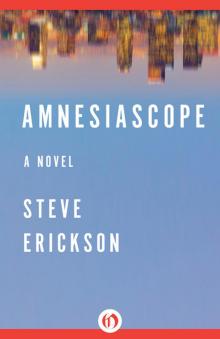 Amnesiascope
Amnesiascope Our Ecstatic Days
Our Ecstatic Days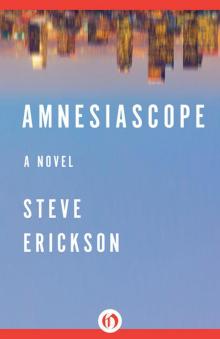 Amnesiascope: A Novel
Amnesiascope: A Novel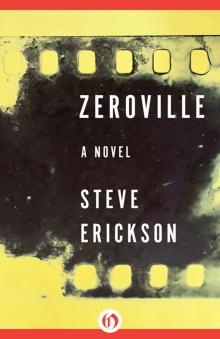 Zeroville
Zeroville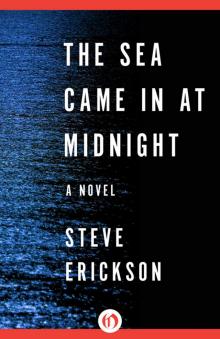 The Sea Came in at Midnight
The Sea Came in at Midnight These Dreams of You
These Dreams of You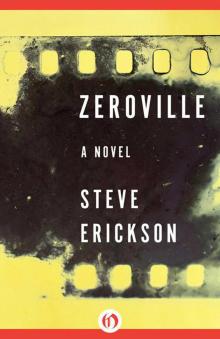 Zeroville: A Novel
Zeroville: A Novel Days Between Stations
Days Between Stations (1993) Arc d'X
(1993) Arc d'X Full-Blooded Fantasy
Full-Blooded Fantasy